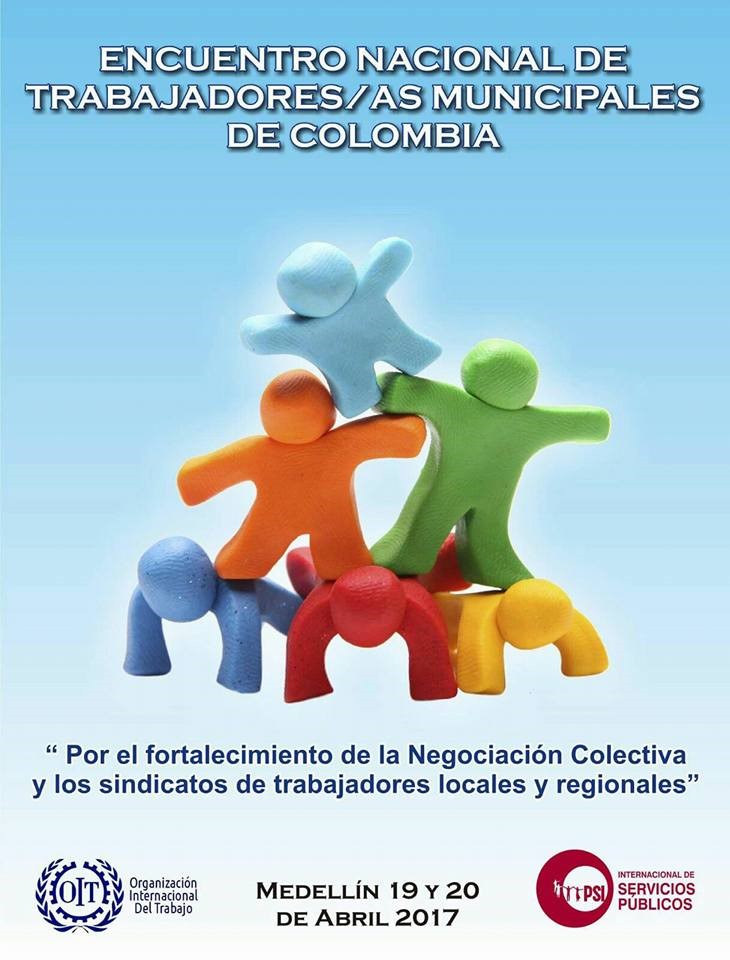Local government unions in Colombia form a national network and improve their collective bargaining skills

About 40 trade union leaders, representing 12 unions in 16 municipalities, including seven regional capitals, accompanied by representatives of the trade union centres Central Unitaria de Trabajadores (CUT) and the Confederación de Trabajadores de Colombia (CTC), shared information on successful rounds of collective bargaining, formulated joint strategies and actions and took on board PSI Local and Regional Government Union priorities and the corresponding PSI Charter.

One of the major challenges facing public sector workers in Colombia is achieving full application of International Labour Organisation Conventions 151 and 154, ratified by Colombia in the form of Acts 411 of 1997 and 524 of 1999 respectively, which came into force in December 2000. Decree 1092 of 2012 (Hyperlink to PDF file in Spanish of this decree) completed the regulatory framework regarding the right to collective bargaining for public employees in Colombia at all levels in compliance with ILO Conventions 151 and 154. Application of Decree 1092 resulted in the first national agreement between unions representing government employees and the national government, signed in May 2013 and followed by a series of territorial and sector level agreements. This paved the way for the promulgation of Decree 160 of 2014, which regulates collective bargaining in the public sector.

The introduction of collective bargaining at the territorial level poses new challenges for local government workers, in terms of improving their pay, working conditions and job security. These challenges include the monitoring of municipal budgets and the identification of good collective bargaining and organisational practices. Collective bargaining in the public sector has been strengthened by nine national conferences, but local government workers have still not succeeded in creating a forum for the coordination and discussion of their specific needs and strategies. Conference participants identified the main challenges they face. They have much in common with those facing all the country’s workers, but they do have specific implications for local government workers:
- Privatisation of public services;
- Workers and employers lack education and knowledge on legal, budgetary, government administration and collective bargaining techniques;
- Violations of the freedom of association, the right to collective bargaining and the right to strike;
- Fragmentation and lack of trade union unity;
- Ineffectiveness of government administrative agencies;
- Relations between leaders and members;
- Inadequate use of information and communication technologies;
- Weaknesses in the regulatory framework for labour relations in the public administration.
In response to these challenges, members of the National Network of Local and Regional Workers agreed to focus their efforts on strategically important targets and actions, including the following:
- Seek alliances with other social sectors in defence of the idea that public services are basic rights;
- Raise public awareness of the role of public services and workers and the need to reverse the privatisation of public services;
- Organise campaigns to develop and strengthen trade unions;
- Develop unity of action in defence of local government workers' rights;
- Push for tripartite decent work agreements at the municipal level; these would also be important for promoting inclusive local development;
- Establish a system for the enforcement of local government collective agreements and take legal action, at both national and international levels;
- Organise unions by sector (by merging local government unions);
- Improve coordination of local government workers by participating in federations, trade union centres and international trade union organisations;
- Build the capacity of local government workers to take action.

A manual entitled "Municipal Budget, Foundations for Collective Agreements" was presented to the conference for use in collective bargaining. It was prepared by SINTRAESTALES leader, Francisco Rincón, over three years in the course of intense trade union education work on the issue in various Colombian municipalities. Both the educational process and the preparation and publication of the manual had the support of the ILO Office for Andean Countries, as part of the project entitled "Building Capacities to Promote Union Membership and Collective Bargaining Coverage” funded by the Norwegian government.
For downloading:
- “Presupuesto Municipal, Fundamentos para los Acuerdos Colectivos” Luis Francisco Rincón Gutiérrez, 2017 (in Spanish)

